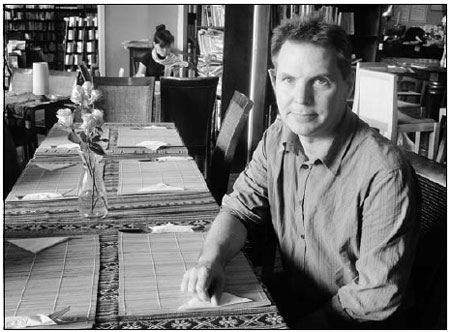Newsmaker
Rebuilding lives
Updated: 2010-12-12 09:50
By Matt Hodges (China Daily)
|
 Peter Goff's Sichuan Quake Relief organization has raised 1.7 million euros. Goff was supplying homeless survivors water and medicine from his car only hours after the quake hit. Matt Hodges / China Daily |
Ireland's Peter Goff, the man who local expatriates credit with galvanizing their close-knit community into action following the May 12, 2008 earthquake in Sichuan province, says he still has 18 months of relief projects to finish in the region.
"There's so much work to be done - tens of thousands of kilometers of highways to be rebuilt, millions made homeless, several hundred power stations damaged or destroyed - the list goes on and on. Our real priority is to make sure people don't get left behind, although a percentage of them will be."
The 8-magnitude earthquake, the worst in China since the Tangshan quake in 1976, killed more than 88,000 people and displaced millions, crippling communities and inspiring a national relief effort some three months before Beijing hosted the Olympic Games.
It reduced the population of Yingxiu town in Wenchuan county, at the quake's epicenter, from 11,000 people to 2,800.
Goff says some local authorities want to escape the years-long cloud the quake has cast over the mountainous region, dubbed "the green heart of China", while other officials recognize that another 18 to 24 months are needed.
"Some people want to think that the job is done, but that's clearly not the case," Goff says, adding that China "probably did more than any other government in the world could have" in terms of providing aid.
The region was rocked again this August by landslides and flooding, events that proved catastrophic for rehabilitation efforts and caused about 1 billion yuan (109 million euros) in direct economic losses.
"I think the victims of the quake are going to have to rebuild those new homes they haven't even moved into yet," says Goff, noting that the local tourism industry "remains in tatters".
Goff, a former foreign correspondent for British dailies, began by covering the 2008 earthquake for The Guardian newspaper. Within hours, he was feeding homeless survivors water and medicine from his car.
By day two, the self-effacing Dubliner was receiving supplies from DHL in Chengdu, about an hour's drive from the quake's closest fault line.
This was part of broader fund-raising efforts in Chengdu, Beijing and Suzhou conducted at outlets of The Bookworm, a popular lending library-cum-cafe he co-founded in 2005.
As the situation snowballed, Goff registered the Sichuan Development Foundation in the UK and Hong Kong, and founded Sichuan Quake Relief (SQR).
SQR, a nonprofit organization, raised 15 million yuan within the first six to eight months of the quake.
"What he achieved was nothing short of remarkable," says Paul Sives, chairman of the Chengdu chapter of the European Union Chamber of Commerce in China.
"He almost single-handedly got the whole expat community here together and galvanized them into action," he says, adding that it is difficult to set up an NGO in China given the country's legal framework.
"And one of the great things about dealing with Peter is that you know exactly where your money is going. It's 100 percent transparent."
The money China has poured into reconstruction efforts in the last 30 months - more than 655 billion yuan, including more than 1.5 million new homes and 3,000 schools - dwarfs that of SQR. But Goff's case illustrates the power of networking and what one man can achieve.
Goff says he was moved by what he saw in the immediate aftermath of the quake, which was followed by 33,000 aftershocks, and by seeing 15 of his 22 staff at The Bookworm lose their homes to the tragedy.
"There were wealthy Chinese people filling their BMWs with water and medicine and driving to affected areas - until they had to be turned away because they were hampering organized aid efforts," he says.
People were soon coming to him, asking what they could do to help.
"We were fortunate in that we had an extensive network of long-term Sichuan residents supporting us," says Goff, who is in his early 40s.
"These included people who worked at companies like Intel, which had 7,000 employees here, so we were getting very reliable contemporary information we could use on a day-to-day basis about exactly which areas needed what kind of aid."
His efforts to help rebuild Sichuan have now moved into a third phase, focused more on incubating grassroots projects and monitoring resources and funds.
He used the example of septuagenarians putting together mahjong (a popular Chinese board game) groups to illustrate how even these small community groups play a crucial role in the healing.
"They serve as an official conduit to the government and are a peaceful way of dealing with issues that come up on a local level," he says.
China Daily
E-paper

Ear We Go
China and the world set to embrace the merciful, peaceful year of rabbit
Preview of the coming issue
Carrefour finds the going tough in China
Maid to Order
Specials

Mysteries written in blood
Historical records and Caucasian features of locals suggest link with Roman Empire.

Winning Charm
Coastal Yantai banks on little things that matter to grow

New rules to hit property market
The State Council launched a new round of measures to rein in property prices.
